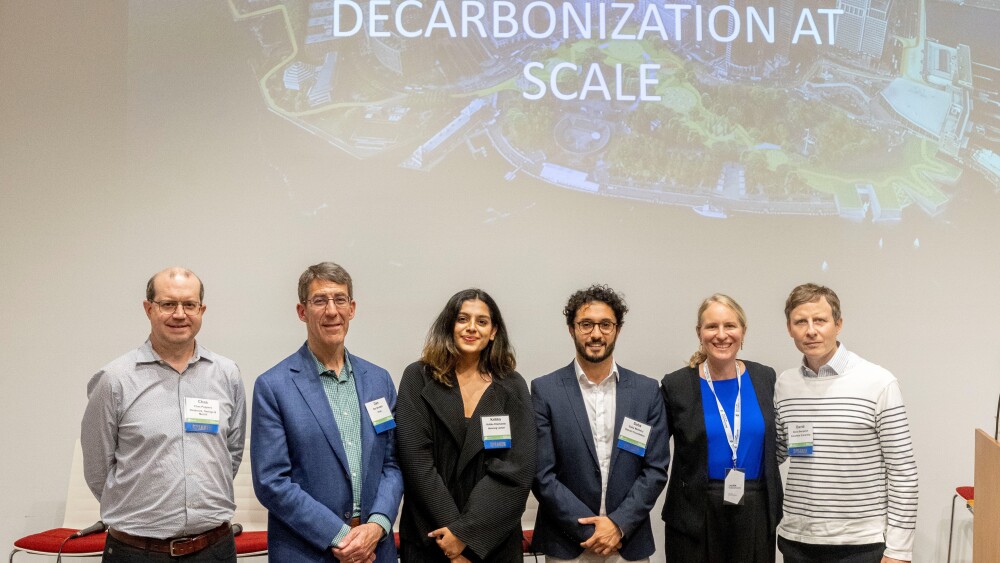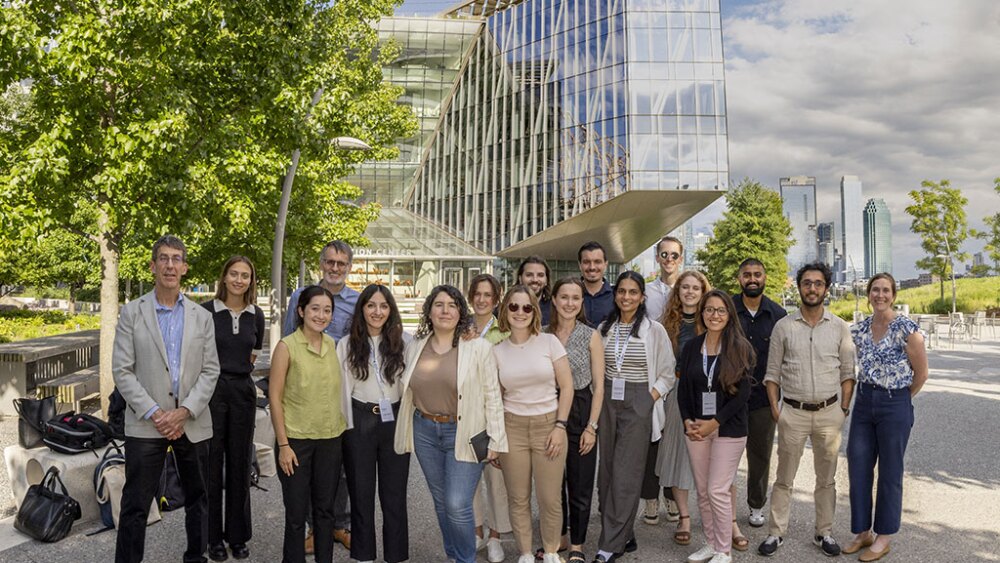In August, ULI New York and the Holcim Foundation hosted a sold-out event on “Decarbonization at Scale,” a topic that has never been more critical for the future of the built environment in North America. The event, held at the AIA New York—Center for Architecture, was a vibrant gathering of leading minds in sustainable design and construction, signaling a strong commitment to knowledge sharing and collaborative innovation.
Felix Ciampa, executive director of ULI NY, and Laura Viscovich, executive director of the Holcim Foundation, opened the evening by emphasizing the shared goal of both organizations: to advance decarbonization efforts in the built environment through impactful knowledge sharing. Their remarks set the tone for a night of insightful discussions and bold ideas aimed at driving significant change in the industry.
North American and global decarbonization challenges
The event’s centerpiece was a dynamic panel of experts in the field: Chas Peppers, research and innovation leader at Skidmore Owings & Merrill (SOM); Dan Brodkin, principal at Arup; Kritika Kharbanda, head of sustainability, innovation, and climate tech with Henning Larsen; Saba Meidany, program manager of sustainable construction at the Holcim Foundation. Moderated by David Benjamin, associate professor at Columbia University and a past Holcim Foundation Award Winner, the panel delved into pressing topics that are shaping the future of the built environment:
- Role of the next generation: With fresh perspectives and a deep commitment to sustainability, the panelists highlighted the critical role of young professionals in driving change as well as the next generation’s role as catalysts for innovation and progress. The next generation, represented by the 2024 Holcim Foundation Fellows, engaged the panel with a series of in-depth questions ranging from the future of biogenic materials to the role of fossil fuel companies in shaping the built environment to professional advice on staying resilient in one’s early career.
- Breaking down silos: Collaboration across disciplines was emphasized as essential for scaling decarbonization efforts. Chas Peppers noted: “We as architects and engineers need to both swim upstream and downstream and not stay in our silos. We need to think about where our materials come from and work directly with builders and not be afraid of [contractual] means and methods.” This sentiment was echoed by other panelists who stressed the importance of integrating diverse expertise to overcome industry challenges. The Fellowship further supports this by fostering collaboration between professionals from various fields—architecture, engineering, urban planning, and real estate—ensuring that innovative ideas are shared and implemented effectively.
- Knowledge transfer and scaling innovations: The conversation also focused on the importance of knowledge transfer across regions, particularly in developing countries. As Kritika Kharbanda pointed out: “A lot of the focus in Europe and North America is on adaptive reuse, whereas in developing countries there is still a big push on new build. If we look across regions, there are different skills and approaches that we need to equip ourselves with based on the markets that we operate in.” This underscores the need for effective knowledge sharing to ensure global progress towards decarbonization. The Holcim Foundation Fellowship aims to bridge these gaps by promoting the global exchange of knowledge, enabling participants to understand and address the unique challenges faced by different regions while scaling innovations that can be adapted to local contexts.
- Risk aversion: The industry’s inherent risk aversion was discussed as a barrier to innovation. David Benjamin captured this challenge by stating: “Anything we do is going to have risks. … We need to develop the intelligence and creativity of balancing the risks of one option versus another option.” Dan Brodkin added: “In North America, a significant [number] of projects end up with some sort of legal claim. There are alternative delivery methods that we can fine-tune to get everyone aligned behind the goals of the project.” The Holcim Foundation Fellowship recognizes the importance of developing leaders who can navigate these risks and drive forward-thinking solutions in a conservative industry, promoting a culture of resilience, learning, humility, and innovation.
- Decarbonization goals in developed vs. developing countries: The panel also explored the differing goals between developed and developing countries. Saba Meidany emphasized the importance of local knowledge and building practices, particularly in developing regions: “While developing countries would like to aspire toward what took place as a result of modernization in developed settings, there is a value to tapping into the local knowledge and building practices that have existed for decades and centuries. So it is also good to build with tried and tested—ancient and vernacular practices—as our examples or with a sense of community in mind, as the context dictates. What is more important is to build what is appropriate in terms of scale, principles, ease of construction, and speed.” The Holcim Foundation Fellowship encourages participants to adopt a holistic view, considering both global standards and local contexts in their sustainability efforts, ensuring that solutions are both scalable and contextually relevant.
Bridging disciplines and expanding perspectives
The event also celebrated the first North America Holcim Foundation Fellowship cohort, an initiative designed to foster cross-disciplinary dialogue and collaboration. Saba Meidany explained: “With the Fellowship, we want to bring in different disciplinary perspectives to talk through the challenges and solutions, but not talk past each other.”
The Fellowship aims to equip participants with a broader understanding of adjacent disciplines, enabling them to effectively transfer ideas and values across different areas of expertise. As the industry moves toward a more collaborative future, such initiatives are vital for scaling innovations, nurturing emerging talent, and achieving meaningful impact.
Call to action
The evening concluded with a powerful call to action for all attendees. The message was clear: the path to decarbonization is complex and fraught with challenges, but through collaboration, innovation, and resilience, the industry can achieve significant progress.
David Benjamin’s closing words resonated with the audience: “If we think of the new buildings to be constructed, they won’t be constructed evenly across the whole world in the next 30 years. How does what we do in North America relate to the massive scale in other parts of the world?” His question serves as a reminder that the decisions made today will have far-reaching implications for the global built environment and the next generation that will inherit it.








